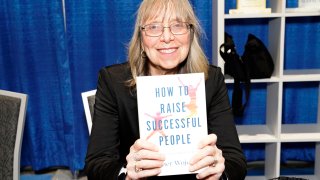
The grades you got in school don't really matter, says educator and bestselling author Esther Wojcicki.
Speaking recently at the World Government Summit in Dubai, Wojcicki said education in the U.S. — and other countries with similar systems — is flawed because it discourages "kids who are super creative but who are not following all of the rules."
"How do we continue to encourage them?" she asked. "The number one way I think we need to [encourage creative students] is we need to cut the importance of grades."
Wojcicki, 81, taught at Palo Alto High School in California for more than three decades. She's also the mother of a doctor and two CEOs: Anne Wojcicki, the co-founder and CEO of 23andMe, and Susan Wojcicki, who announced on Thursday that she's stepping down as CEO of YouTube after more than 20 years at Google.
Get Southern California news, weather forecasts and entertainment stories to your inbox. Sign up for NBC LA newsletters.
Wojcicki's decades of teaching high school taught her that good grades are overrated, and not a significant indicator of a child's future success. Yet they're an important factor in how the country's education system views students' success and determines their future opportunities, she said in Dubai.
"Everybody is fighting for grades and those grades lead to college, and if you don't have those grades you cannot go," Wojcicki said.
Valuing grades above all else encourages students to "memorize" facts to perform well on tests, sometimes leaving behind intelligent and creative students who who don't excel at memorization, she added.
Money Report
Some neurologists argue that memorization has benefits like exercising your brain, and that remembering information is the first step to understanding it.
But education experts contend that prioritizing high test scores — rather than demonstrating deep understanding of materials — fails to teach important learning skills.
"Today's multi-tasking, over-stimulated kids have few learning skills," William Klemm, a professor of neuroscience at Texas A&M University, told Texas A&M Today in 2017. "Schools are so obsessed with teaching to the test that they fail to teach students how to learn."
In Dubai, Wojcicki pushed for partial but meaningful changes to the American education system, de-emphasizing grades in favor of fostering students' creativity and innovation skills.
"How about every kid [has] a class in innovation, once a week or maybe once a day? Something where they can actually come up with ideas that matter to the whole planet, not just to the U.S. [but] everywhere," Wojcicki suggested.
"We need kids to be able to think our way out of the problems that face our world. And school, as it is set up today, does not do that ... especially in the U.S." she added.
When teachers place a greater focus on creativity in classroom assignments, students are more likely to learn problem solving and critical thinking skills — and retain more of what they learn, a 2019 Gallup survey of U.S. teachers and students found.
Last year, parenting expert Margot Machol Bisnow wrote about her experience interviewing 70 parents of successful entrepreneurs for CNBC Make It. The one skill every parent taught their kids was curiosity, which allowed them to think critically "and arrive at more creative solutions," she noted.
Wojcicki said her own daughters excelled in school, earning strong enough grades to attend schools like Harvard, Yale and Stanford. But she still made sure they "did not cringe when they got a bad grade," she said.
"The No. 1 thing you need to do, not only for your children but for your students, is have them believe in themselves," she said. "And you don't believe in yourself as long as you get really bad grades and then you go home and your parents yell at you. That doesn't work."
Get CNBC's free Warren Buffett Guide to Investing, which distills the billionaire's No. 1 best piece of advice for regular investors, do's and don'ts, and three key investing principles into a clear and simple guidebook.
Sign up now: Get smarter about your money and career with our weekly newsletter






